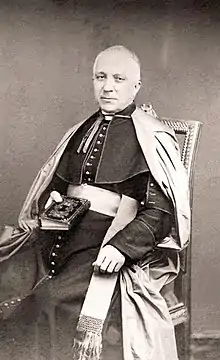Prospero Caterini
Prospero Caterini (15 October 1795, in Onano – 28 October 1881, in Rome) was an Italian cardinal.
His Eminence, the Most Rev. Lord Prospero Caterini | |
|---|---|
| Secretary of the Supreme Sacred Congregation of the Universal and Roman Inquisition | |
 Prospero Caterini | |
| Church | Roman Catholic |
| Installed | 21 December 1876 |
| Term ended | 28 October 1881 |
| Predecessor | Costantino Patrizi Naro |
| Successor | Antonio Maria Panebianco |
| Other post(s) | Cardinal-Deacon of Santa Maria della Scala Cardinal-Deacon of Santa Maria in Via Lata Cardinal-Protodeacon |
| Orders | |
| Created cardinal | 7 March 1853 by Pope Pius IX |
| Rank | Cardinal-Deacon |
| Personal details | |
| Born | 15 October 1795 |
| Died | 28 October 1881 (aged 86) Rome, Kingdom of Italy |
| Buried | Chapel of the confraternity of the Most Precious Blood, Campo Verano cemetery, Rome, Kingdom of Italy |
| Denomination | Roman Catholic |
| Parents | Francesco Caterini and Maria Domenica Pacelli |
Biography
Prospero Caterini was born in Onano, diocese of Acquapendente[1] in the region of Lazio in what was then the Papal States. His parents were Francesco Caterini and Maria Domenica Pacelli[1] both from noble families. Prospero's paternal aunt, Maria Antonia Caterini was married to another Pacelli, Gaetano Pacelli thus making Prospero Caterini a relative to the Pacelli family on both his mother's and father's sides. Maria Antonia Caterini and Gaetano Pacelli were the parents of Marcantonio Pacelli, who served as minister of finance for Pope Gregory XVI and deputy minister of interior under Pope Pius IX from 1851 to 1870 and also founded the newspaper L’Osservatore Romano on 20 July 1860.[2] In 1939, Eugenio Pacelli, one of Marcantonio's grandsons was elected to the papacy as Pope Pius XII.
The Caterinis themselves traced their nobility to the Cattanei or Cattaneo family, specifically to Gualdo Cattaneo whose family were the Counts of Aversa in 1520. The name "Caterini" was taken due to the family's devotion to St. Catherine of Alexandria. Those with the surname Caterini later became part of the nobility of Nocera Umbra, Acquapendente and Onano.
Near Grotte di Castro in the vicinity of Lake Bolsena, the Caterini family had a castle, the Castle of Santa Cristina where the young seminarian Eugenio Pacelli, the future Pope Pius XII would spend his holidays in the company of the Pacelli-Caterini families.
Prospero Caterini completed his studies in Rome.[1] No information has been found as to his ordination history.[1] He served as the substitute secretary of the Sacred Congregation Consistorial and was later the Secretary of the Sacred Congregation of Studies.[1] From 1 March 1841 to 28 November 1845, he was Auditor Santissimi.[1] He was a canon of Saint Peter's Basilica and became an Assessor of the Sacred Congregation of the Inquisition.[1]
Pope Pius IX created him a cardinal on 7 March 1853 and three days later on 10 March, the new cardinal received the red hat and the title of Cardinal-Deacon of Santa Maria della Scala.[1] He became Cardinal-Protodeacon on 6 November 1876 upon the death of the incumbent protodeacon Cardinal Giacomo Antonelli. On 18 December 1876, he opted for and received the title of Cardinal-Deacon of Santa Maria in Via Lata previously held by the late Cardinal Antonelli while retaining in commendam the title to the deaconry of Santa Maria della Scala.[1] On 21 December 1876, he became secretary of the Inquisition.[1]
Prospero Caterini participated as a cardinal-elector in the conclave of 1878.[1] As protodeacon, he announced at the end of the conclave the election of Cardinal Gioacchino Pecci as Pope Leo XIII.[1][lower-alpha 1] Due to illness however, he was unable to crown the new pope at his papal coronation,[1] the honor instead went to Cardinal Teodolfo Mertel.[5]
He died on 28 October 1881 and after the wake held at his deaconry, was buried at the chapel of the confraternity of the Most Precious Blood in Campo Verano cemetery in Rome.[1]
See also
Notes
- Richard Henry Clarke's book about Leo XIII claims that Prospero Caterini made the announcement of Leo XIII's election[3] and Salvador Miranda's entry on Cardinal Caterini at The Cardinals of the Holy Roman Church website mentions Caterini as having given the announcement[1] but Francis Burkle-Young claims that Caterini started to make the announcement but was incapable of completing the formula and was ultimately assisted in delivering the news by Bartolomeo Grassi-Landi, a non-cardinal and the conclavist of Cardinal Luigi Oreglia di Santo Stefano[4]
References
- "Caterini, Prospero". Cardinals of the Holy Roman Church. Salvador Miranda.
- "The Origins of L'Osservatore Romano, Vatican Website". Archived from the original on 21 February 2008.
{{cite web}}: CS1 maint: bot: original URL status unknown (link) - Richard Henry Clarke (1903). The life of His Holiness Pope Leo XIII ...: together with extracts from his pastorals and encyclicals.
- Francis A. Burkle-Young (2000). Papal Elections in the Age of Transition, 1878-1922. Lexington Books. ISBN 9780739101148.
- "The Coronation of Pope Leo XIII". Catholic World Volume 27, Issue 158 pp. 280-285.
Bibliography
- Caterini Carlo. Gens Catherina de terra Balii. Edizioni Scientifiche Calabresi.Rende 2009.
External links
- The Cardinals of the Holy Roman Church
- Catholic Hierarchy [self-published]
- "PROSPER CATERINI".